
Y Combinator Startup Podcast
By Y Combinator

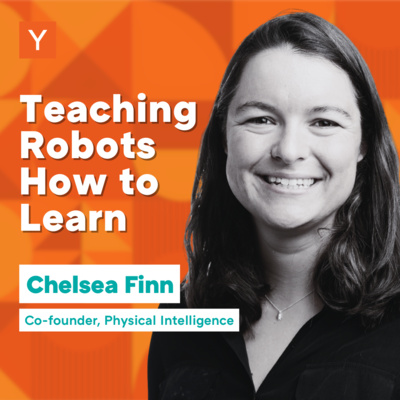
Chelsea Finn: Building Robots That Can Do Anything
Chelsea Finn on June 17th, 2025 at AI Startup School in San Francisco.From MIT through her PhD at Berkeley, where she pioneered meta‑learning methods, and Google Brain, Chelsea Finn has built her career around teaching machines how to learn. Now an Assistant Professor at Stanford and co‑founder of Physical Intelligence, she’s using that foundation to bring learning-driven robotics into messy, real-world environments rather than confined lab setups.In this talk, Chelsea traces the evolution of her team’s work—from early experiments on robotic grasping and vision to today’s ambitious efforts at folding laundry, tidying kitchens, and generalizing across tasks—all without hand-crafted code. Instead, they used scalable foundation models and massive datasets, teaching robots physical common sense as they learn by doing. She shares stories of the rocky setbacks, the surprises hidden in data, and the moment it all clicked: robots equipped with generalizable physical intelligence can indeed adapt and assist in the unpredictable world around us.
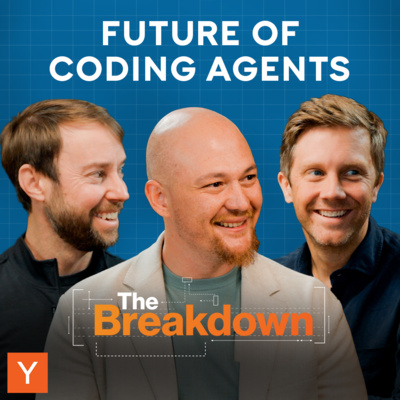
Replit CEO Amjad Masad: Coding Agents, Autonomy, and the Future of Work
Amjad Masad started Replit to make programming accessible to anyone, anywhere. What began as a tool for learning to code has grown into a platform pushing the limits of AI-assisted software creation and recently surpassed $100M in ARR.On The Breakdown with Tom and Dave, Amjad shares the journey from his early days in Jordan, working on open-source projects, to leading Replit through major pivots from "teach a billion people to code" to "let anyone build software." He discusses the evolving nature of programming, the future of work, and the next generation of human-computer collaboration.
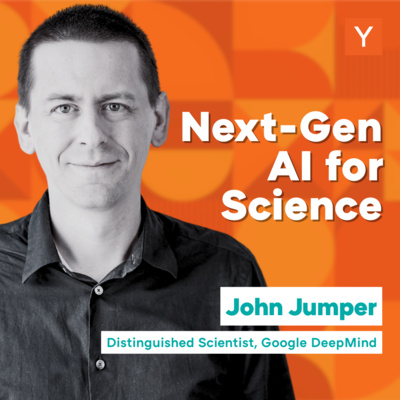
John Jumper: AlphaFold and the Future of Science
John Jumper on June 16, 2025 at AI Startup School in San Francisco.
John Jumper is a physicist-turned-computational biologist who led DeepMind’s AlphaFold team—and earned the 2024 Nobel Prize in Chemistry for solving protein folding, a decades-old scientific challenge.
In this talk, he shares how a deep learning breakthrough at CASP14 turned into AlphaFold 1 and then AlphaFold 2, delivering atomic accuracy predictions and revolutionizing biology. He explains the scientific puzzle behind protein folding, the key algorithmic breakthroughs, and the impact of making millions of protein structures accessible to researchers worldwide.
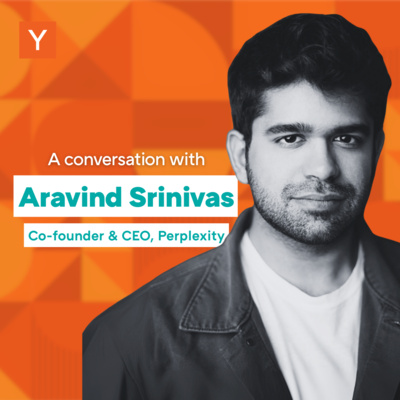
Aravind Srinivas: The Race to Build the AI Browser of the Future
Aravind Srinivas on June 16, 2025 at AI Startup School in San Francisco.Aravind Srinivas started Perplexity with one goal: to rethink how we search, browse, and interact with information online. In this conversation, he shares the journey from hacking together a natural-language-to-SQL search tool to building a product used by millions around the world.He talks about the big bet on the AI-powered browser, why agents—not just chatbots—are the next step, and how speed, accuracy, and focus help a startup compete against giants. Along the way, he reflects on co-founder dynamics, early technical challenges, and what it takes to keep building when the biggest players in the world are racing alongside you.
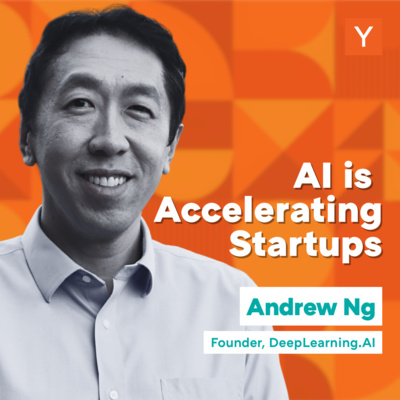
Andrew Ng: Building Faster with AI
Andrew Ng on June 16, 2025 at AI Startup School in San Francisco.Andrew Ng has helped shape some of the most influential movements in modern AI—from online education to deep learning to AI entrepreneurship. In this talk, he shares what he’s learning now: why execution speed matters more than ever, how agentic workflows are changing what startups can build, and why concreteness beats vagueness when turning ideas into products. He reflects on the rise of AI coding assistants, the shifting bottlenecks in product development, and why, despite faster software, it’s still human judgment and responsibility that will shape what comes next.

François Chollet: The ARC Prize & How We Get to AGI
François Chollet on June 16, 2025 at AI Startup School in San Francisco.
François Chollet is a leading voice in AI. He's the creator of the Keras library, author of Deep Learning with Python, and the founder of the ARC Prize, a global competition aimed at measuring true general intelligence.
He's spent years thinking deeply about what intelligence actually is—and why scaling up today’s AI models isn’t enough to reach it.
In this talk, he walks through the limits of pretraining and memorized skills, and lays out a path toward true general intelligence—AI that can adapt on the fly, reason in new situations, and invent novel solutions. He explains why abstraction and compositionality matter, how ARC became the benchmark for progress, and what his team at a new research lab called Ndea is building next.

Fei-Fei Li: Spatial Intelligence is the Next Frontier in AI
A fireside with Dr. Fei-Fei Li on June 16, 2025 at AI Startup School in San Francisco.Dr. Fei-Fei Li is often called the godmother of AI—and for good reason. Before the world had AI as we know it, she was helping build the foundation.In this fireside, she recounts the creation of ImageNet, a project that helped ignite the deep learning revolution by providing the data backbone modern computer vision needed. She walks through the early belief in data-driven methods, the shock of seeing convolutional networks outperform expectations in 2012, and how those breakthroughs led to captioning, storytelling, and ultimately, generative models.Now, she’s taking on one of AI’s hardest frontiers: spatial intelligence. Fei-Fei shares why modeling the 3D world is essential for AGI—and why it may be even more difficult than language.

Legendary Consumer VC Predicts The Future Of AI Products
Kirsten Green, founder of Forerunner Ventures, has backed some of the most iconic consumer brands of the past two decades — from Warby Parker to Chime to Dollar Shave Club.
In this conversation with Garry, she shares how great products (not marketing tricks) still win, why AI is unlocking a new kind of emotional relationship between consumers and technology, and what founders can learn from the messy creative stage we're in right now. She also breaks down how shifts in distribution, wellness, and digital behavior are reshaping what it means to build for real human needs.

Satya Nadella: Microsoft's AI Bets, Hyperscaling, Quantum Computing Breakthroughs
A fireside with Satya Nadella on June 17, 2025 at AI Startup School in San Francisco.Satya Nadella started at Microsoft in 1992 as an engineer. Three decades later, he’s now Chairman & CEO, navigating the company through one of the most profound technological shifts yet: the rise of AI.In this conversation, he shares how Microsoft is thinking about this moment— from the infrastructure needed to train frontier models, to the social permission required to use that compute. He draws parallels to the early PC and internet eras, breaks down what makes a great team, and reflects on what he’d build if he were starting his career today.

Sam Altman: The Future of OpenAI, ChatGPT's Origins, and Building AI Hardware
A fireside with Sam Altman at AI Startup School in San Francisco.Sam Altman grew up obsessed with technology, broke into the Stanford mainframe as a kid, and dropped out to start his first company before turning 20.In this conversation, he traces the path from early startup struggles to building OpenAI—sharing what he’s learned about ambition, the weight of responsibility, and how to keep building when the whole world is watching. He opens up about the hardest moments of his career, the limits of personal productivity, and why, in the end, it's all still about finding people you like working with and doing something that matters.

Elon Musk: Digital Superintelligence, Multiplanetary Life, How to Be Useful
A fireside with Elon Musk at AI Startup School in San Francisco.Before rockets and robots, Elon Musk was drilling holes through his office floor to borrow internet. In this candid talk, he walks through the early days of Zip2, the Falcon 1 launches that nearly ended SpaceX, and the “miracle” of Tesla surviving 2008. He shares the thinking that guided him—building from first principles, doing useful things, and the belief that we’re in the middle of an intelligence big bang.

Andrej Karpathy: Software Is Changing (Again)
Andrej Karpathy's keynote at AI Startup School in San Francisco.Drawing on his work at Stanford, OpenAI, and Tesla, Andrej sees a shift underway. Software is changing, again. We’ve entered the era of “Software 3.0,” where natural language becomes the new programming interface and models do the rest.He explores what this shift means for developers, users, and the design of software itself— that we're not just using new tools, but building a new kind of computer.
Slides provided by Andrej: https://drive.google.com/file/d/1a0h1mkwfmV2PlekxDN8isMrDA5evc4wW/view?usp=sharing

Cursor CEO: Going Beyond Code, Superintelligent AI Agents And Why Taste Still Matters
Michael Truell, co-founder and CEO of Anysphere, the company behind Cursor, joins Garry to talk about building one of the fastest-growing startups of all time—and why he's betting on a future beyond code. He walks through the early insights that led his team to leave a promising AI-powered CAD project and instead chase a bigger dream: reinventing how software is written. From years of false starts and rewrites to Cursor's breakthrough moment, Michael explains what it takes to build a tool that could eventually replace programming as we know it. He also reflects on their first 10 hires, why taste still matters and how the decade ahead will unlock a new kind of creativity for builders everywhere.

Fusion Energy Is Tech's Next Big Unlock
Fusion may still sound like science fiction— but it might not be for much longer. With AI pushing demand for clean power to new highs, a breakthrough may finally be close.
For Decoded, YC General Partner Gustaf Alstromer traces the history of fusion, the physics behind it, and the engineering challenges that stalled it for nearly a century.
He also looks at how Helion is approaching the problem differently, as they develop a new fusion system expected to deliver power to Microsoft by 2028.

AI Apps Are Broken — Here's How To Fix Them
In this episode of The Breakdown, Tom and Dave are joined by fellow YC General Partner Pete Koomen to lay out a new vision for how AI should actually work: not as a chatbot bolted onto legacy software, but as a customizable tool that helps people offload the work they don't want to do.
From editable system prompts to agents that act more like collaborators, they dig into what it means to build AI-native software—and why the future belongs to products that let users teach machines how to think.

How AI Coding Agents Will Change Your Job
Coding agents are no longer a distant idea—they're already starting to reshape how we work.
YC's Tom Blomfield and David Lieb discuss how AI coding tools are transforming software development, why small, high-agency teams will be able to do what once took armies of engineers, and why there's never been a better time to start something new.
They explore the bigger picture too: a future where there's abundance, knowledge work becomes more accessible, and founders have more leverage than ever before.
If you're thinking about building, there's no better moment than right now.

How To Get The Most Out Of Vibe Coding | Startup School
AI can't yet one-shot an entire product—but with the rise of vibe coding, it's getting close. YC's Tom Blomfield has spent the last month building side projects with tools like Claude Code, Windsurf, and Aqua, seeing just how far you can push modern LLMs. From writing full-stack apps to debugging with a single paste of an error message, AI is becoming a legit collaborator in the dev process. This is a playbook for anyone who wants to get the most out of vibe coding and build faster.

How Zepto Became India’s Fastest Growing Startup
Imagine ordering groceries and having them show up at your doorstep in just 10 minutes. That’s the promise of Zepto, the fastest-growing e-commerce company in India.
In this episode of How To Build The Future, Garry sits down with Aadit Palicha, the co-founder and CEO of Zepto, to discuss how they got started in a Whatsapp group, what it’s like going up against incumbents like Amazon and Zomato and how the future of e-commerce is changing in the age of intelligence.

Why America Stopped Innovating - And How We Can Start Again
Not long ago, America led the world in building and innovation. But over the past 50 years, bureaucracy and red tape have made it nearly impossible to get big things done.
Still, there’s a growing movement to turn that around — to build faster, smarter, and better than ever before.
In this episode of The Main Function, Garry sits down with Atlantic staff writer and Plain English podcast host Derek Thompson to discuss his new book Abundance (co-authored with Ezra Klein). They discuss how we got here, what needs fixing, and what a bold, more prosperous 2050 could look like.
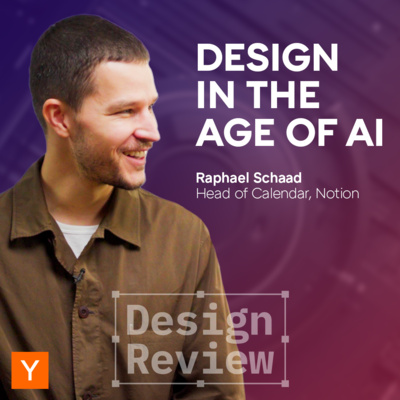
What Founders Can Do To Improve Their Design Game
In this special episode of Design Review, Aaron sits down with Raphael Schaad, the Head of Calendar at Notion to discuss his leap from designer to founder, why illustration is an important first step when building a new product, and what ultimately makes designers uniquely qualified to start a company today.

How to Build the Future: Tony Xu
12 years after starting DoorDash, co-founder & CEO Tony Xu and his employees still do deliveries every year, staying true to their core value: customer obsession.
Today, DoorDash is the largest food delivery platform in the US.
In this episode of How to Build the Future, Tony explains how their unwavering long-term vision won — helping create a new market while surviving near death and a global pandemic along the way.

Customer Obsession Made Gusto A $9.6 Billion Company
Gusto (https://gusto.com) made payroll and HR painless for small businesses, growing into a $9.6B company along the way.
Co-founder & CEO Josh Reeves joined YC's Harj Taggar to share how they built a payroll company from scratch and their customer-first approach to product design and culture.

The Future Of Design With Figma's Dylan Field
Design isn’t just about making things work—it’s about how they work, says Dylan Field, the co-founder & CEO of Figma.
As AI transforms tech, he believes a designer's judgment, taste, and agency will matter more than ever.
Dylan sat down with YC's Garry Tan to discuss the evolving world of design in the age of AI, the challenging early days at Figma, and how his team forever changed the way designers and engineers collaborate.

How To Build The Future: Aravind Srinivas
YC General Partner David Lieb sits down with Aravind Srinivas, the co-founder and CEO of Perplexity, to discuss his origins in Silicon Valley, what it's like to compete with Google, and what the future of search could look like.
Apply to Y Combinator: https://ycombinator.com/apply

Building A Supersonic Plane Company From The Ground Up
Imagine flying from NY to London in just a few hours. That’s the future that Blake Scholl and his team at Boom Supersonic are working towards.
Blake started as a software engineer and pivoted mid-career to aviation. Now, he’s at the forefront of trying to bring back supersonic travel for all of us.
In this episode of Hard Tech, YC’s Jared Friedman visited Blake in the Mojave desert to find out how someone who didn’t have a background in aerospace engineering was able to build the first-ever independently developed supersonic plane.

The Right (And Wrong) Way To Spend Money At Your Startup
Many startups fail because they run out of money. So how should you think about how to spend the money you raise?
In this episode of Office Hours, YC General Partners Brad Flora, Pete Koomen, Nicolas Dessaigne, and Gustaf Alströmer discuss how to spend responsibly at each stage of a startup— including advice on when to hire, whether to invest in marketing and what spending mistakes to avoid.
Apply to Y Combinator: https://ycombinator.com/apply

How To Build The AGI Future: Bob McGrew
According to OpenAI's former Chief Research Officer Bob McGrew, reasoning and test-time compute will unlock more reliable and capable AI agents— and a path to scale to AGI.
In this episode of How to Build the Future, YC's @garrytan sits down with Bob to discuss the lessons learned from his time at OpenAI, scaling laws, his advice for startups, and what all of this means for the jobs of the future.

How To Use AI In Your Startup
AI continues to improve at an exponential pace. So what can you do as a founder to take advantage of it?
In this episode of Office Hours, YC Partners discuss what you should consider if you’re thinking about pivoting to or incorporating AI as part of your startup.

How To Build The Future: Parker Conrad
In this episode of How to Build the Future, Garry sits down with Parker Conrad, Co-founder & CEO of Rippling, the all-in-one HR, Finance, and IT software company that’s valued at $13.5 billion.
Parker is the co-founder of two unicorns and has one of the more dramatic startup journeys in recent years. In this interview, he shares his origin story, the lessons learned from his first two companies, how AI is changing the game, and why he thinks the future will be defined by "compound" software startups.

Building A $2 Billion SaaS Company: Lessons From A Two Time Founder
Two-time founder Rujul Zaparde knows a thing or two about resilience and learning from failure.
After dropping out of college to build FlightCar, he worked as a PM at Airbnb, and later as a visiting partner at YC.
In 2020, he co-founded Zip, a procurement software company that has since raised $370 million and reached a $2.2 billion valuation.
In this conversation with YC's Dalton Caldwell, Rujul demystifies the world of enterprise sales, shares his hard-earned lessons about scaling a business from zero, and explains how founders can use first-principles thinking to better approach the challenges of building a startup.

How David Lieb Turned A Failed Startup Into Google Photos | Backstory
YC General Partner David Lieb’s story is all about perseverance. In 2008 he co-founded Bump, one of the hottest startups of the early iPhone era. But even with 150 million users, he couldn’t find a way to create a sustainable business. For many founders, that would be the end of the road. But he didn’t quit there. Instead, David and his team pivoted several times, got acquired, and eventually went on to build Google Photos.
In this episode of Backstory, he shares his advice for finding the right idea, what mistakes to avoid, and how to maintain a positive mindset no matter what gets thrown at you.

How To Start A Dev Tools Company with Nicolas Dessaigne | Startup School
YC's Nicolas Dessaigne was the co-founder and CEO of @algolia, a Search API used by millions of developers to build great search experiences into their apps and websites. Today it powers over 1.75 trillion searches annually for 17,000+ customers worldwide.
In this episode of Startup School, @dessaigne shares his advice for founders building a dev tools company from the ground up— covering everything from team and idea to GTM and sales.

Twitter vs. X: Product Lessons For Startup Founders | The Breakdown
Since Twitter rebranded to X, the platform has added new features and implemented a few major updates to both its UX and algo. So what can founders interested in product design learn from all this? In the first episode of our new series, The Breakdown, YC’s Tom Blomfield (co-founder of Monzo) and David Lieb (creator of Google Photos) take a closer look at X to find what lessons there are for founders building consumer products.

How To Build The Future: Sam Altman
It’s fair to say that few people in tech are positioned to have a bigger impact on the future than Sam Altman. At OpenAI, Sam and his team have overseen monumental leaps forward in machine learning, generative AI, and most recently, LLMs that can reason at PhD levels. And this is just the beginning. In his latest essay Sam predicted that ASI (Artificial Super Intelligence) is just a few thousand days away. So how did we get to this point?
In this episode of our rebooted series "How To Build The Future," YC President and CEO Garry Tan sits down with Sam to talk about the origins of OpenAI, what’s next for the company, and what advice he has for founders navigating this massive platform shift.

How Do Billion Dollar Startups Start? | Office Hours
The biggest companies in the world all had to start somewhere. In this episode of Office Hours, the Group Partners explore the humble origins of several top YC companies to try and identify common traits of the most successful founders. They’ll explore what it takes to keep your company alive in the early days, where to focus your energy and how to find product market fit that leads you to mega success.

Why Design Matters: Lessons from Stripe, Lyft and Airbnb | Design Review
Stripe, Airbnb and Lyft are a few of the most successful companies of the past decade. And there are at least two things they all have in common - great design, and Katie Dill. Katie was Head of Experience Design at Airbnb, led the design team at Lyft and is now Head of Design at Stripe. We spoke with Katie about her design philosophy, what sets companies like Stripe apart, and how important it is to instill a culture of design in your startup from day one.

How To Find A Co-Founder with Harj Taggar | Startup School
Building a startup and trying to break into an established market is very difficult, especially if you’re trying to do it alone! That’s why it’s critical to find the right co-founder for the journey. In this episode of Startup School, YC Group Partner Harj Taggar explains why you need a co-founder, when to bring them on, where you can find one and how to maintain the relationship.

How To Convert Customers With Cold Emails with Aaron Epstein | Startup School
Whether it's for sales, recruiting or making new connections, cold outreach is a necessary tool for helping build your startup. But as you probably know, most cold emails either are ignored or end up in the trash. So what can you do to make sure your emails break through the noise? In this episode of Startup School, YC Group Partner Aaron Epstein shares expert advice on how to write cold emails that have all the right ingredients to get noticed and convert new customers.

How To Improve Cohort Retention with David Lieb | Startup School
At YC our motto is make something people want. But how do you actually know if you’ve accomplished that in the early days? One of the best ways to measure successful growth is a concept called cohort retention, which tracks the fraction of new users that come back time and time again to use your product. In this episode of Startup School, YC Group Partner David Lieb explains how to define cohorts, track active users and determine the appropriate time frame for measuring successful retention rates.

Co-Founder Equity Mistakes to Avoid with Michael Seibel | Startup School
In order to get your startup off the ground it's critical to keep your co-founders motivated. One of the best ways to do that is to figure out a fair co-founder equity split. In this episode of Startup School, YC Group Partner Michael Seibel explains the ins and outs of co-founder equity, why it's important to be generous with that equity, and how to avoid bad advice that can lead to co-founder breakups.

How Nothing Founder Carl Pei Built A Multi-Million Dollar Smartphone Brand In Just 2 Years | Main Function
After co-founding the successful Chinese smartphone maker OnePlus, Carl Pei felt the tech industry was missing the fun and wonder he remembered as a dedicated gadget fan growing up in Sweden. Pei decided to launch a new smartphone brand, this time with an increased focus on thoughtful user interface and stylish yet practical designs. In only two years, the brand known as "Nothing" has gained a cult following and gone to $600 million in annualized revenue. On this episode of The Main Function, Pei reflects on the highs and lows that have come with the journey of pursuing excellence in hard tech.

How To Price For B2B with Tom Blomfield | Startup School
If you're a startup founder, how much should you charge for your product or service? It's a simple question that can make many lock up. What number should you pick? In this episode of Startup School, YC Group Partner Tom Blomfield guides you on how to come up with a price and then justify that number to customers.

Why Startup Founders Should Launch Companies Sooner Than They Think | Office Hours
Launching a company is often pictured as a big splashy event with lots of media attention and hype. This can be scary! It also often results in founders delaying their launches, which then stalls the crucial lessons they could be learning.
In this episode, YC Partners discuss this common hesitation and why it can be harmful to the journey and growth of a startup.

Enterprise Sales with Pete Koomen | Startup School
Y Combinator Partner Pete Koomen led his startup, Optimizely, to $100M ARR. In this video, Pete breaks down the enterprise sales funnel and shares his top tips on how a technical founder can start closing real deals for their startup.

Startup Experts Discuss Doing Things That Don't Scale | Office Hours
A little over ten years ago Paul Graham published the essay "Do Things That Don't Scale." At the time, it was highly controversial advice that spoke to the drastically different needs of an early startup versus the needs of a much larger, more established company.
YC Partners discuss PG's essay, its influence on Silicon Valley, and some prime examples of YC founders that embraced the mantra "Do Things That Don't Scale."
Read Paul Graham's essay here: http://paulgraham.com/ds.html

How to Survive the Crypto Boom & Bust Cycle | Main Function
Over the past decade crypto has been declared dead hundreds of times. But with the price of Bitcoin surging over the past few months it’s clear that there are still enormous opportunities in this space. And few people know that better than Chandan Lodha, the co-founder of CoinTracker (W18), a crypto asset management and tax filing platform. He and his team have navigated several boom and bust cycles over the years and in this latest episode of The Main Function, you’ll hear about how they built their company, the time it nearly fell apart, and how they used a crypto winter to retool and emerge stronger than ever.

Consumer Startup Metrics with Tom Blomfield | Startup School
In this episode of Startup School, YC Partner Tom Blomfield dives deeper into the metrics that matter most for consumer startups. Tom discusses paid and organic user growth, unit economics, net promoter scores, and the "magic moment" in your product that is most important to track.

When Should You Trust Your Gut? | Dalton & Michael Podcast
When you’re making important decisions as a founder — like what to build or how it should work — should you spend lots of time gathering input from others or just trust your gut? In this episode of Dalton & Michael, we talk more about this and how to know when you should spend time validating and when to just commit. Apply to Y Combinator: https://yc.link/DandM-apply Work at a Startup: https://yc.link/DandM-jobs

Building Confidence In Yourself and Your Ideas | Dalton & Michael Podcast
One trait that many great founders share is conviction. In this episode of Dalton & Michael, we’ll talk about finding confidence in what you're building, the dangers of inaccurate assumptions, and a question founders need to ask themselves before they start trying to sell to anyone else. Apply to Y Combinator: https://yc.link/DandM-apply Work at a Startup: https://yc.link/DandM-jobs

Stop Innovating (On The Wrong Things) | Dalton & Michael Podcast
Startups need to innovate to succeed. But not all innovation is made equal and reinventing some common best practices could actually hinder your company. In this episode, Dalton Caldwell and Michael Seibel discuss the common innovation pitfalls founders should avoid so they can better focus on their product and their customers. Apply to Y Combinator: https://yc.link/DandM-apply Work at a Startup: https://yc.link/DandM-jobs